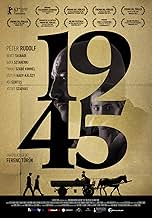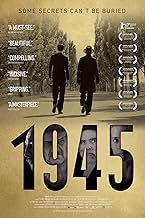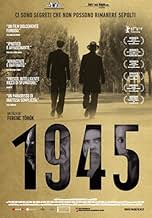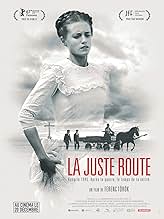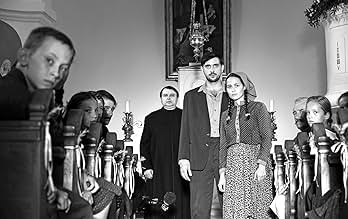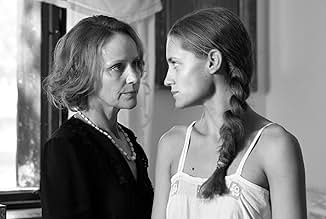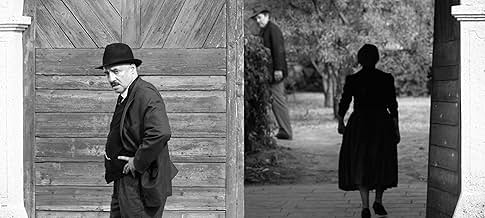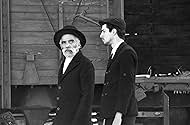CALIFICACIÓN DE IMDb
7.1/10
4.4 k
TU CALIFICACIÓN
Dos misteriosos extraños vestidos de negro aparecen en la estación de tren de un pueblo húngaro. En pocas horas, todo cambia.Dos misteriosos extraños vestidos de negro aparecen en la estación de tren de un pueblo húngaro. En pocas horas, todo cambia.Dos misteriosos extraños vestidos de negro aparecen en la estación de tren de un pueblo húngaro. En pocas horas, todo cambia.
- Dirección
- Guionistas
- Elenco
- Premios
- 7 premios ganados y 5 nominaciones en total
Angelus Iván
- Sámuel Hermann
- (as Iván Angelusz)
- Dirección
- Guionistas
- Todo el elenco y el equipo
- Producción, taquilla y más en IMDbPro
Opiniones destacadas
A very powerful and moving drama. A perfect illustration of human greed. The cinematography of Ferenc Török's team is technically perfect, the authoritative script, well-made costumes and the highly suggestive musical outline. A description of how the infamities perpetrated in the course of life are paid at a high price, on the one hand the devastated Jewish people and on the other those who wanted to take advantage in the bloody period of the war and the territory of none of the material possessions without any mercy. In conclusion, everyone pays, without exception, those who have lost their loved ones in the death camps and those who have lost them for their cruelty. The movements of the camera, the perspectives, the points of view and the objects in the frame are of high school and the film is shot in a beautiful and very clean black and white. The ending is masterful and I think that in my mind the images of the black smoke of the train that can be combined with the lives killed in the crematoria of the Nazi prison camps will never be erased, I cried for them. Magnificent work of art.
It's a brilliant story of guilt and buried secrets coming to the fore. Using the aesthetics of a western with direct borrowing from High Noon and from Sergio Leone, especially the waiting for the train scene in Once Upon a Time in the West. But in this case its used to point the complete absence of any real hero from the story. The most heroic act performed by any character in this movie is going away.
This story is a story about all consuming guilt, about petty jealousies and how sin is its own punishment. But above all it's a story of how the war doesn't end when it ends. And it's done with a very competent hand and deep understanding of cinematic media. A very good ensemble of actors, amazing cinematography, great story and superlative directing.
This story is a story about all consuming guilt, about petty jealousies and how sin is its own punishment. But above all it's a story of how the war doesn't end when it ends. And it's done with a very competent hand and deep understanding of cinematic media. A very good ensemble of actors, amazing cinematography, great story and superlative directing.
Previous reviews have failed to take account of this film's "Sitz im Leben"-- the current situation in Hungary, where the Fidesz government under Orbán Viktor has played footsie with the broad swath of irredentist voters who continue to harbor anti-Semitic leanings. Hungary has not yet come to terms with its role in the murder of its Jewish citizens. For example, the recently erected monument to Victims of Nazi Aggression portrays Hungary as a Victim State, not as a willing cooperator in the execution of roughly 5% of the national population. But it was Hungarian officials that carried out the orders, not Germans. Hungarian officialdom and non-officialdom was more than willing to participate in the Holocaust, but they are loath to acknowledge any corporate responsibility.
A personal but illustrative anecdote. About seven years ago I was teaching at a gimnázium in a town not far from Budaptest and went to see the movie "Avatar" at a local theater over a weekend. The next Monday, as part of English conversation class, I told my students what I had done, that I had gone to thus and such theater to see the movie. The immediate response to my statement came from a student whom I had come to know as a pretty bright kid who was eager to learn. He said, "Oh yes, Jews own that theater."
Where the f*** did that come from? Over the past few years I have realized that it comes from the same deep-rooted inability of Hungarians to understand that their loss of territory after WWI and their continuing economic problems come not from their "enemies" (Jews above all, but Gypsies too) but from themselves and the same culture of self-deception and corruption that is depicted in this film.
Which film, by the way, is elegantly framed and carefully composed, is presented with almost stately precision, and which I highly, highly recommend.
A personal but illustrative anecdote. About seven years ago I was teaching at a gimnázium in a town not far from Budaptest and went to see the movie "Avatar" at a local theater over a weekend. The next Monday, as part of English conversation class, I told my students what I had done, that I had gone to thus and such theater to see the movie. The immediate response to my statement came from a student whom I had come to know as a pretty bright kid who was eager to learn. He said, "Oh yes, Jews own that theater."
Where the f*** did that come from? Over the past few years I have realized that it comes from the same deep-rooted inability of Hungarians to understand that their loss of territory after WWI and their continuing economic problems come not from their "enemies" (Jews above all, but Gypsies too) but from themselves and the same culture of self-deception and corruption that is depicted in this film.
Which film, by the way, is elegantly framed and carefully composed, is presented with almost stately precision, and which I highly, highly recommend.
An unflinching portrait of the power of conscience and the human effect of its avoidance. The post-modern narrative of identity politics and Nietzschean and victim culture here vaporizes into the dustbin of history. Human choices matter. Memory matters. Morality matters. Selfishness and structural, political complicity therewith lead to social disintegration. As C.S. Lewis wrote, revenge is the predictable arc of human affairs. There is only one thing that breaks the cycle of material human history and that is forgiveness.
Go. See. This. Film.
During wars, people do hidious crimes. At WW2 many decent, next door people like you and me, took advantage of the anti-jewish pogrom and stole their property. But the war ended in 1945, and some of them manage to return and reclaim their properties... what happened then? The guilt of course, that's what happened. I think it's the only Hungarian film i have ever watched and if you come across it, don't pass it by. Its a film worth seeing.
¿Sabías que…?
- TriviaFor the role, Péter Rudolf gained 33 pounds (15 kg)
Selecciones populares
Inicia sesión para calificar y agrega a la lista de videos para obtener recomendaciones personalizadas
- How long is 1945?Con tecnología de Alexa
Detalles
- Fecha de lanzamiento
- País de origen
- Sitio oficial
- Idiomas
- También se conoce como
- Fortyfive
- Locaciones de filmación
- Kalocsa, Hungría(location)
- Productora
- Ver más créditos de la compañía en IMDbPro
Taquilla
- Presupuesto
- EUR 1,467,000 (estimado)
- Total en EE. UU. y Canadá
- USD 1,006,193
- Fin de semana de estreno en EE. UU. y Canadá
- USD 20,365
- 5 nov 2017
- Total a nivel mundial
- USD 1,240,738
- Tiempo de ejecución1 hora 31 minutos
- Color
Contribuir a esta página
Sugiere una edición o agrega el contenido que falta


